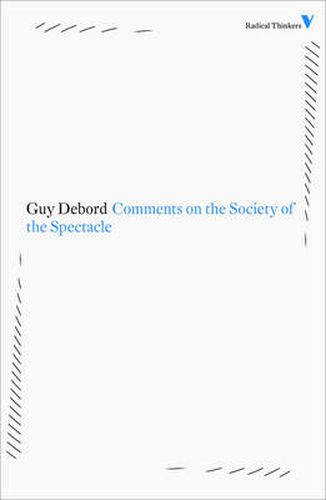Readings Newsletter
Become a Readings Member to make your shopping experience even easier.
Sign in or sign up for free!
You’re not far away from qualifying for FREE standard shipping within Australia
You’ve qualified for FREE standard shipping within Australia
The cart is loading…






First published in 1967, Guy Debord’s stinging revolutionary critique ofcontemporary society, The Society of the Spectacle has since acquired acult status. Credited by many as being the inspiration for the ideasgenerated by the events of May 1968 in France, Debord’s pitiless attackon commodity fetishism and its incrustation in the practices of everydaylife continues to burn brightly in today’s age of satellite televisionand the soundbite. In Comments on the Society of the Spectacle, publishedtwenty years later, Debord returned to the themes of his previousanalysis and demonstrated how they were all the more relevant in aperiod when the integrated spectacle was dominant. Resolutely refusingto be reconciled to the system, Debord trenchantly slices through thedoxa and mystification offered tip by journalists and pundits to showhow aspects of reality as diverse as terrorism and the environment, theMafia and the media, were caught up in the logic of the spectacularsociety. Pointing the finger clearly at those who benefit from the logicof domination, Debord’s Comments convey the revolutionary impulse atthe heart of situationism.
$9.00 standard shipping within Australia
FREE standard shipping within Australia for orders over $100.00
Express & International shipping calculated at checkout
First published in 1967, Guy Debord’s stinging revolutionary critique ofcontemporary society, The Society of the Spectacle has since acquired acult status. Credited by many as being the inspiration for the ideasgenerated by the events of May 1968 in France, Debord’s pitiless attackon commodity fetishism and its incrustation in the practices of everydaylife continues to burn brightly in today’s age of satellite televisionand the soundbite. In Comments on the Society of the Spectacle, publishedtwenty years later, Debord returned to the themes of his previousanalysis and demonstrated how they were all the more relevant in aperiod when the integrated spectacle was dominant. Resolutely refusingto be reconciled to the system, Debord trenchantly slices through thedoxa and mystification offered tip by journalists and pundits to showhow aspects of reality as diverse as terrorism and the environment, theMafia and the media, were caught up in the logic of the spectacularsociety. Pointing the finger clearly at those who benefit from the logicof domination, Debord’s Comments convey the revolutionary impulse atthe heart of situationism.